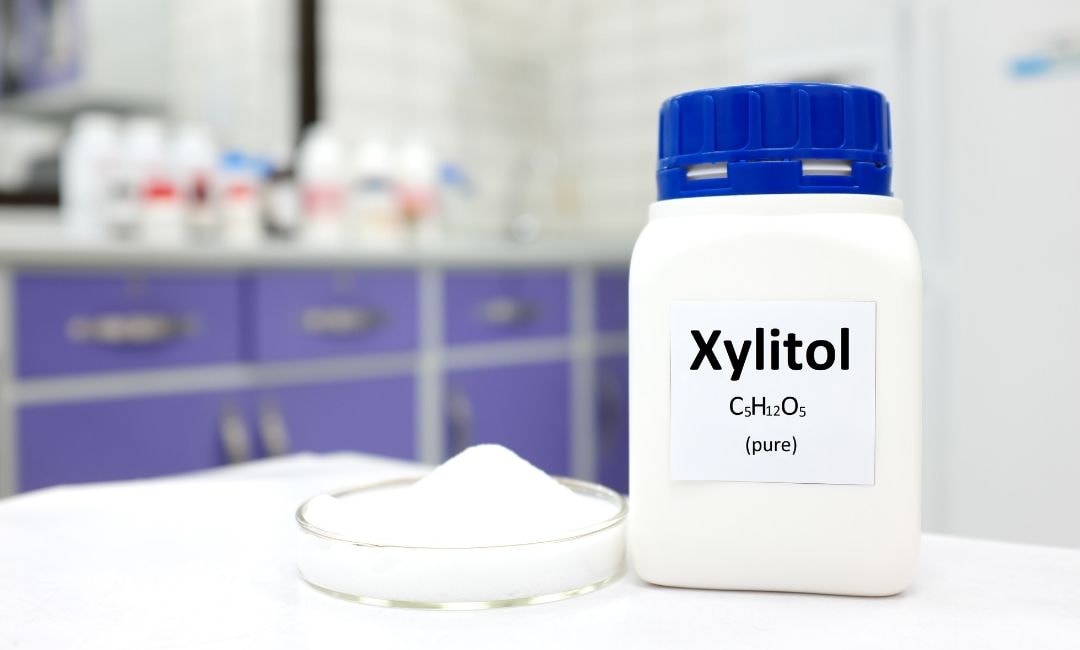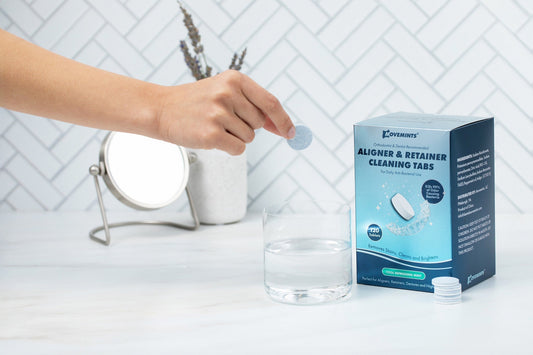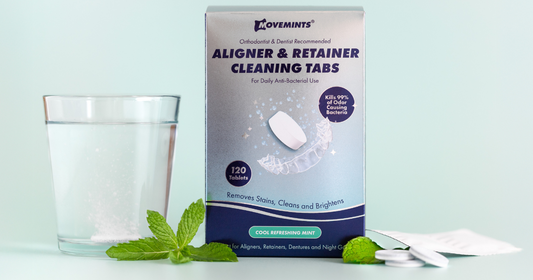Debunking Xylitol Side Effects Myths: Considerations and Benefits Explained
Heard some scary rumors about xylitol? Don't sweat it. We're about to bust those myths wide open and reveal the real deal about this sugar substitute. Turns out, xylitol might actually be your mouth's new best friend.
In this article, we'll cover:
- The truth about xylitol side effects (and why most of them are just hot air).
- Surprising benefits of xylitol for your teeth and overall health.
- Smart ways to use xylitol, so you can enjoy the good stuff without any worries.
Speaking of enjoying xylitol... ever heard of Movemints? They're these awesome little sugar-free breath mints with xylitol that are perfect for people with aligners! They help keep your mouth fresh and even make your aligners fit better!
Xylitol Side Effects: Separating Fact from Fiction
Let's get one thing straight: xylitol-containing chewing gum is generally safe for most people. But like any good thing, too much of it can cause some, unpleasantness. Think of it like coffee – a cup or two can perk you up, but chugging a whole pot might leave you buzzing (and not in a good way).
So, what's the deal with xylitol side effects? Well, most of the scary stories you've heard are just that – stories. But there are a few things you should know, especially if you're new to the xylitol game.
Digestive Upset: The Usual Suspect
The most common side effect of xylitol? A bit of tummy trouble. Some may experience gas, bloating, and diarrhea. This happens because xylitol is a sugar alcohol, which your body digests a bit differently than regular sugar.
Here's the good news: These effects usually only happen when you eat a lot of xylitol at once. Start with a small amount and gradually increase it to give your body time to adjust.
Pro tip: If you're prone to digestive issues, try Movemints. They contain a small dosage of xylitol that's gentle on your stomach, so you can enjoy the benefits without the, uh, explosive consequences.
Blood Sugar
Another myth we need to bust is that xylitol spikes your blood sugar. Nope. Xylitol actually has a very low glycemic index (GI), meaning it doesn't cause those crazy blood sugar swings that can leave you feeling hangry. This makes it a good option for people with diabetes or anyone watching their blood sugar levels.
Allergic Reactions
While rare, some people can be allergic to xylitol. If you notice any hives, itching, or swelling after using xylitol (even with no sugar intake), stop using it and talk to your doctor. Better safe than sorry.
Dental Issues
Here's a plot twist: xylitol is actually good for your teeth. It helps prevent cavities and can even remineralize enamel. But, like with anything, moderation is key. Chewing on xylitol gum or sucking on mints all day long could lead to jaw pain or even tooth wear.
Pets: A Big No-No
One very important thing to remember is that xylitol is toxic to dogs. Even small amounts can cause serious problems, like liver failure and seizures. So, keep your xylitol goodies out of reach of your furry friends.
Pro tip: If you think your pet has ingested xylitol, contact your veterinarian or the ASPCA Animal Poison Control Center immediately.
That's all the truth about xylitol's side effects. As you can see, most of the "scary" stuff is either exaggerated or easily avoidable. So, go ahead and enjoy the benefits of xylitol without worry. Just remember to start slow, listen to your body, and keep it away from your pets.
Xylitol Benefits

Now that we've tackled the scary stuff (and hopefully put your mind at ease), let's talk about why xylitol is so awesome. This stuff isn't just another pretty sweetener – it comes with a whole bunch of benefits for your teeth and your overall health.
A Perfect Tool for Your Smile
Remember how we said xylitol is an incredible solution for your teeth? Well, here's why:
- Cavity fighter: Xylitol prevents those pesky bacteria in your mouth from producing acid, which is the main culprit behind cavities.
- Enamel booster: Xylitol can actually help remineralize your enamel, making your teeth stronger and more resistant to decay.
- Dry mouth relief: If you suffer from dry mouth (a common side effect of many medications or of wearing aligners), xylitol can help stimulate saliva production. This keeps your mouth feeling comfy and helps wash away food particles.
Want to give your teeth an extra boost of xylitol power? Pop a Movemint after meals or whenever you need to seat your aligners. They're sugar-free, orthodontist-developed, and come in a bunch of tasty flavors.
Beyond Your Pearly Whites
Xylitol has also been linked to some pretty impressive health benefits beyond your mouth:
- Ear infection prevention: Studies suggest that xylitol helps reduce the risk of ear infections, especially in children.
- Improved gut health: Xylitol acts as a prebiotic, feeding the good bacteria in your gut.
- Bone health support: Some research suggests that xylitol helps increase bone density, which is important for preventing osteoporosis.
Pretty cool, right? Try some Xylitol candies today and see why it is a great addition to keep your mouth healthy!
Using Xylitol Like a Pro
Ready to add xylitol to your routine? Here's how to do it effectively:
- Start slow: Begin with a small amount of xylitol and gradually increase your intake to allow your body to adjust. This helps minimize potential digestive discomfort.
-
Choose the right products: Xylitol comes in various forms, including:
- Mints: Enjoy xylitol mints for a quick and refreshing way to freshen your breath. Movemints are a great option, especially for aligner wearers, as they help seat aligners.
- Granulated sweetener: Use xylitol as a sugar substitute in baking and cooking. Remember that it's slightly sweeter than sugar, so you may need to adjust recipes accordingly.
- Toothpaste and mouthwash: Look for oral care products containing xylitol for added protection against cavities.
- Spread it out: Consume xylitol throughout the day, rather than all at once, to maximize its benefits.
- Combine with oral hygiene: Xylitol is not a replacement for brushing and flossing. Use it as part of a comprehensive oral care routine for optimal results.
- Consider your needs: If you have specific health concerns, such as diabetes or digestive issues, consult your doctor or a registered dietitian to determine the appropriate xylitol intake for you.
Xylitol for Dry Mouth

We've talked a lot about the benefits of xylitol, especially for combating dry mouth. But what about those dry mouth products that contain xylitol? Are there any downsides to these alternative sweeteners?
The good news is that xylitol itself is generally safe and effective for relieving dry mouth. It stimulates saliva production, which helps keep your mouth lubricated and comfortable. However, some dry mouth products contain other ingredients that might cause side effects.
Here's what to watch out for:
- Alcohol: Some mouthwashes and oral rinses contain alcohol, which can actually worsen dry mouth over time. Look for alcohol-free options.
- Artificial sweeteners: Certain artificial sweeteners may cause digestive upset or other side effects in some people. Check the ingredient list and opt for products with natural sweeteners like xylitol.
- Strong flavors: Intensely flavored products can sometimes irritate a dry mouth. Choose milder flavors or consider products with natural flavorings.
If you experience any discomfort or side effects after using a dry mouth product with xylitol, discontinue use and consult your doctor or dentist.
Sweeten Your Day (and Your Oral Health) with Xylitol
We've explored the ins and outs of Invisalign and retainers, weighed their pros and cons, and given you the knowledge to choose the best option for your needs. But whether you're popping in a fresh set of aligners or snapping on your retainers, remember that your smile journey doesn't have to be a sugar-free slog.
Unlike sugar, table sugar, or cane sugar, which can cause blood sugar spikes and contribute to tooth decay, xylitol delivers a sweet taste without the negative side effects. This popular sugar substitute, often found in sugar-free gum and mints, is a sugar alcohol that, unlike other sugar alcohols, actually helps fight cavities. So go ahead and embrace the transformation – with a smile that's both healthy and sweet.
Key takeaways
- Xylitol is generally safe and well-tolerated, with minimal side effects when used in moderation.
- It's a powerful weapon against cavities and can even help strengthen your teeth.
- Xylitol offers additional health benefits, including improved gut health and potential bone health support.
- Remember to start slow, choose the right products, and keep xylitol away from your furry friends.
Speaking of xylitol products, have you tried Movemints? They're the perfect way to enjoy the benefits of xylitol while freshening your breath and keeping your aligners in place. Plus, they're orthodontist developed and come in a variety of delicious flavors. Give them a try and experience the difference.
Xylitol FAQs
Does xylitol have side effects?
Yes, but don't worry. Most side effects are mild and usually only occur with excessive consumption. The most common ones are digestive issues like gas, bloating, and diarrhea. Starting with a small amount and gradually increasing your intake can help your body adjust.
Who should not use xylitol?
- Pets: Xylitol is extremely toxic to dogs, even in small amounts. Keep it out of reach of your furry friends.
- People with allergies: While rare, some individuals may be allergic to xylitol. If you experience hives, itching, or swelling after using xylitol, discontinue use and consult your doctor.
- Individuals with specific dietary concerns: If you have diabetes or digestive issues, talk to your doctor or a registered dietitian to determine the appropriate xylitol intake for you.
Is xylitol hard on the liver?
Unlike some artificial sweeteners, xylitol is not processed by the liver. This means it won't put any extra strain on this vital organ.
What are the symptoms of xylitol intolerance?
If you're intolerant to xylitol, you might experience digestive discomfort such as gas, bloating, cramps, and diarrhea. These symptoms typically occur after consuming a significant amount of xylitol.
Does xylitol cause inflammation?
Actually, it's quite the opposite. Some studies suggest that xylitol may have anti-inflammatory properties. More research is needed, but this is definitely good news.
Is xylitol bad for gut health?
This is where things get interesting. You see, our gut is home to trillions of bacteria (the gut microbiome), and some of these bacteria are super important for our health.
Now, some studies initially raised concerns that xylitol might disrupt the balance of these bacteria. However, newer research shows that xylitol actually supports gut health by increasing the production of beneficial compounds called short-chain fatty acids (SCFAs).
Think of SCFAs as "food" for the good bacteria in your gut. They help these bacteria thrive and do their job of keeping us healthy. So, not only is xylitol not bad for your gut, but it might actually be beneficial.



